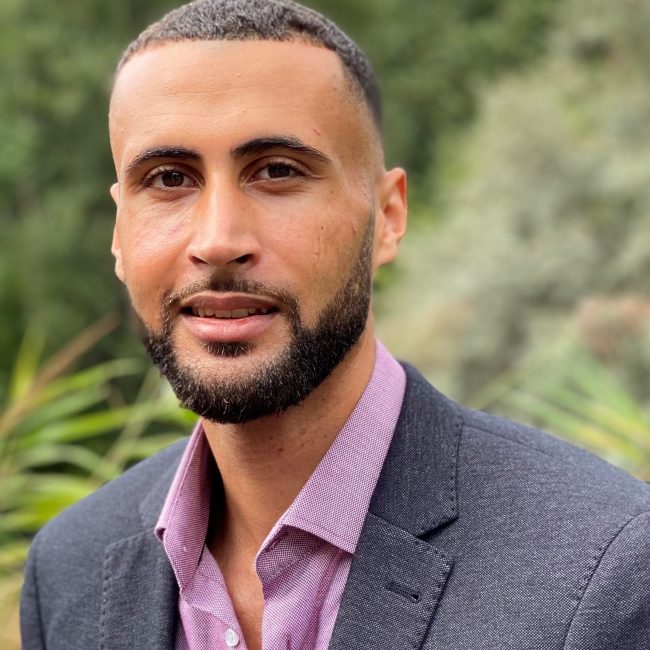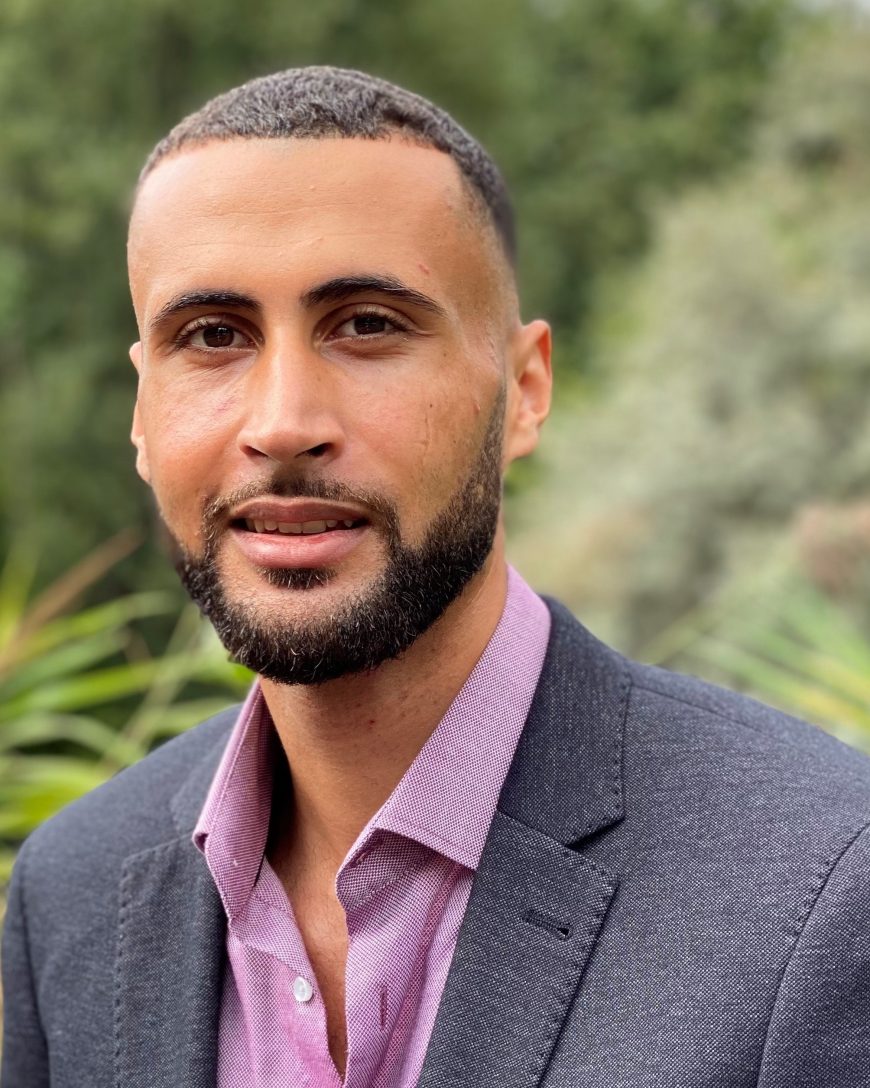Curated conversations with data and AI for social impact leaders on their career journeys
Pathways to Impact is a series of conversations with data for social impact leaders exploring their career journeys. Perry Hewitt, CMO of data.org, spoke with George Kibala Bauer, the Director of Digital Utilities at GSMA about the benefits of multidisciplinarity throughout his career.
Tell us a little bit about yourself. What brought you to work in data science for social impact (DSSI)?
I’ve always been driven by a passion for economic development. I came into this field after completing my master’s in international economic policy at Sciences Po in Paris. My studies focused on economic policy in Africa, with an emphasis on public-private sector collaboration in infrastructure and service delivery. I believe that to really make progress against the challenges that we face as a world and to meet the sustainable development goals, there really needs to be more collaboration between the public and the private sectors. This needs to be underpinned by companies seeking to go beyond mere short-term value-creation for shareholders, and a desire to contribute to solving the long-term challenges the communities they work in face.
One challenge that stood out to me across a number of different experiences in developmental economics is the issue of data scarcity. I vividly remember researching different economic trajectories of various African countries and noticing that certain data sets were out of date. There were certain analyses that I couldn’t rely on because I just wasn’t sure whether the data was up-to-date. This frustration set me out on a path to DSSI.
Are you working on the data scarcity challenge today at GSMA? What else keeps you busy?
I am! Recently, my team and I published a report titled Innovative Data for Urban Planning, The Opportunities and Challenges Associated with Public-Private Data Partnerships. In that report, we highlight how data scarcity affects urban planning and inclusive urban service provision, and how innovative data sources such as mobile network operator data, remote sensing data, utility services data and other digital services data, could help meet the challenge. Accessing this data could provide huge public benefit. There’s so much we could do with more and better data, but this requires tackling and overcoming barriers to public-private data collaboration.
Unfortunately, today a lot of innovative data held by the private sector isn’t used to inform public policymaking. If we look at some of the challenges that transport authorities in many cities face, for instance, rolling out a new bus rapid transit system, which requires understanding where to place the optimal bus stop locations, oftentimes these kinds of decisions are being made in a context of data scarcity. So by partnering with private sector data providers, such as mobile operators and ride-sharing companies, and also by engaging in innovative survey methods that use mobile tools, public sector transport authorities can leverage much more information, and make better forward-looking decisions.
I've embraced multidisciplinarity throughout my career, and it’s proven to be a true advantage. I've always thought that in order to solve complex challenges, you need to be open to different schools of thought, and different fields as well.
George Kibala Bauer Director, Digital Utilities GSMA
Personally, I gravitated toward the topic of data in urbanization because 90% of urban growth from now until 2050 will be concentrated in Africa and in Asia. Africa hosts many of the fastest-growing cities in the world. And for me, that rapid transformation presents not only an important challenge, but also an exciting opportunity: 2/3 of infrastructure investments from now until 2050 in African cities are yet to be made. So, there’s a huge opportunity for urban policymakers across the continent to make evidence-based planning decisions. These decisions would ensure that cities across the continent become engines of economic prosperity and social mobility – and that could yield returns over the coming decades. To do this work well, cities need to invest in their public sector data capabilities and build enduring public-private partnerships around data.
We hear a lot about the value of and potential for partnerships in our Inclusive Growth and Recovery Challenge conversations. It’s not always easy, is it?
Partnerships require a lot of effort and communication. There are a range of barriers to successful partnerships: the need to take local contexts into account, the digital capacity of the public sector, aligning different stakeholders with competing priorities, identification of economic models financing those partnerships. Launching partnerships correctly and stewarding them is never easy, but the impact can be enormous.
Our work at GSMA AI for Impact program and the GSMA Digital Utilities program is driving public-private partnerships that can allow the public sector to make use of different kinds of data sets. Obviously, what we’re highlighting throughout that work, though, is the complexity of creating and maintaining those partnerships. Saying, “build a partnership” is not enough.
What in particular has fueled your career progression? Any blockers you’ve overcome?
I’ve embraced multidisciplinarity throughout my career, and it’s proven to be a true advantage. I’ve always thought that in order to solve complex challenges, you need to be open to different schools of thought, and different fields as well. As a result, I’ve been passionate about not just immersing myself in developmental economics, econometrics, and data analysis, but also in political economy, sociology, economic history, understanding postcolonial societies, and so on.
That multidisciplinarity has really helped me to understand why certain projects fail, and to have a sense for the kind of implementation challenges you might face when something looks very good on paper from a data scientist perspective.
I’ve also benefited from studying and then working with a lot of inspiring people solving different kinds of problems. And that breadth has helped me gain the perspective that a lot of paths towards progress aren’t that linear – there are lessons to be learned from setbacks and course changes along the way.
Finally, I’ve always been quite passionate about elevating the representation of people of color within the international development sector. I’ve been lucky enough to have older mentors that are also people of color working in the sector. By engaging with some of those mentors, I’ve really gained a lot of knowledge and was better positioned to navigate some of the challenges one faces as a person of color in the sector.
I understand that you have strong mentors, and benefit from learning from those who have come before you. But is there a broader community that you rely on that bolsters your work?
That’s a great question. My work currently sits at the intersection of a lot of different themes. There isn’t necessarily an existing digital-utilities-mobile-big-data-in-cities community!
Instead, I try to learn from different communities that do exist. When working in big data — and any field that’s related to digital innovation — it’s really important to pay attention to the frontier of research. What’s going on at the cutting edge? I make sure to follow a wide range of researchers because it allows me to also understand where the field is moving, and what opportunities there might be in the future.
On the flip side, what gives me a lot of inspiration is to not only be informed of the latest theory, but also to develop a deep understanding of the problems we seek to solve. Our team at GSMA focuses on supporting urban resilience in low- and middle-income countries. And we’re specifically focused on improving the livelihoods of lower income urban populations. When you look at algorithms being created, and you look at the challenges that these low-income populations and cities are facing, there’s sometimes a stark disconnect: people can’t eat an algorithm, right? As practitioners we need to make the work very relevant to the problems that communities are facing. Staying close to those realities drives my work, and ensures we are together developing effective programs and interventions that can actually be sustainable, and accurately respond to challenges.
What non-data science skillset has offered the greatest return in your work?
I’d have to say that being trained in political economy of development has really helped me because understanding the way decision-making in governments actually operates is critical for success. It’s critical also from a data scientist’s perspective, because obviously if you’re in partnership with a government institution, you want to understand the incentive structure that impacts that public sector stakeholder to gain adoption. But more significantly, you also want to ensure that the outputs of your data analysis will actually be implemented and are able to support the decision-maker in their own context.
The need to understand the context of the public sector stakeholder is something we flagged in our report on Innovative Data for Urban Planning. We highlighted a range of different product outputs, ranging from reports to apps, to visualization, to a decision support system. Getting those product outputs right requires co-creation with the user of the output, which often is the public sector, from the outset of the project. Of course, throughout the product development there might be things that evolve, and interests that emerge, so it’s important to remain adaptable and responsive – but early alignment is critical.
Something else I’d like to point out – and to be more disciplined about myself — is to make use of the amazing array of opportunities in online courses and additional resources that are now available for people that want to learn more about data science in the context of specific subfields and sectors. Last year I completed a fellowship on climate tech with OnDeck. and it really opened my eyes to the opportunity of big data use cases in the context of climate mitigation resilience and adaptation. There’s a lot out there!
Part of the Pathways to Impact series
What advice do you have for someone who’s new to the field, but interested in getting started in this kind of work?
My advice would be to not be discouraged by the fact that one is new to the field – consider that newness to be a feature, not a bug. Data science for social impact always needs new energy, because it benefits so greatly from people who bring experiences in other industries or different backgrounds of study. Combining one’s own unique background with a certain data science skillset can open the door to new use cases, and new ways of applying data. As a field, it’s something we encourage. It’s exciting that there’s a growing community of people with diverse skill sets and backgrounds that is entering the field; it doesn’t feel as lonely anymore!
Another important thing for people considering doing work in this area is that the data for good space is quite broad. You can work in big corporations. You can work for NGOs. You can work for enabling organizations. You can work in philanthropy. As a new entrant, it’s really important to find something that aligns with your values and sense of impact because there is a range of different avenues to impact in the field.
What do you see as the next big thing in data for science for social impact?
Within the GSMA digital utilities team, we’re quite excited about the opportunities associated with the Internet of Things and are planning to write a report demystifying some of the use cases on IoT. For example, the use of sensors in a water utility to detect leakages is becoming more common and relevant as hardware costs decline and the technological sophistication of the different suppliers’ increases. We see IoT and the data it generates as a powerful tool for social impact.
But then, more generally speaking, beyond the field of IoT, I think what we’re also going to see is more public-private collaboration on data sharing, and more institutionalized partnerships that go beyond pilots. Our goal is to help drive the creation of long-term partnerships that can deliver value to the public sector, while also creating benefits and clarity to the private sector stakeholders that are engaged in the partnership.
Just for fun: what’s your don’t-miss daily or weekly read?
I really enjoy the MIT Tech Review. They often write interesting articles about data science, but take a very critical perspective and look closely at themes related to diversity, bias, and societal implications of data and algorithms.
There’s also a publication that was recently launched called Rest of World. I really like it because it shares tech stories from the perspective of people living in emerging markets, and takes into account the opportunities and risks associated with digital innovation. This is so important, given that we’ve seen that even in the richest countries of the world, digital innovation and data can have a lot of negative externalities. If we look at topics related to AI applications and policing in the context of institutionalized racism, there are important moral questions that we have to think about as a society. I appreciate the publications that open our minds to those important perspectives and considerations.
About the Author
Chief Strategy Officer Perry Hewitt joined data.org in 2020 with deep experience in both the for-profit and nonprofit sectors. She oversees the global data.org brand and how it connects to partners and funders around the world.
Read moreSeries
Pathways to Impact
This data.org series interviews leaders in Data Science for Social Impact with a lens of how they got there, as well as the skills and experiences that have fueled their career progression.
data.org In Your Inbox
Do you like this post?
Sign up for our newsletter and we’ll send you more content like this every month.
By submitting your information and clicking “Submit”, you agree to the data.org Privacy Policy and Terms and Conditions, and to receive email communications from data.org.


